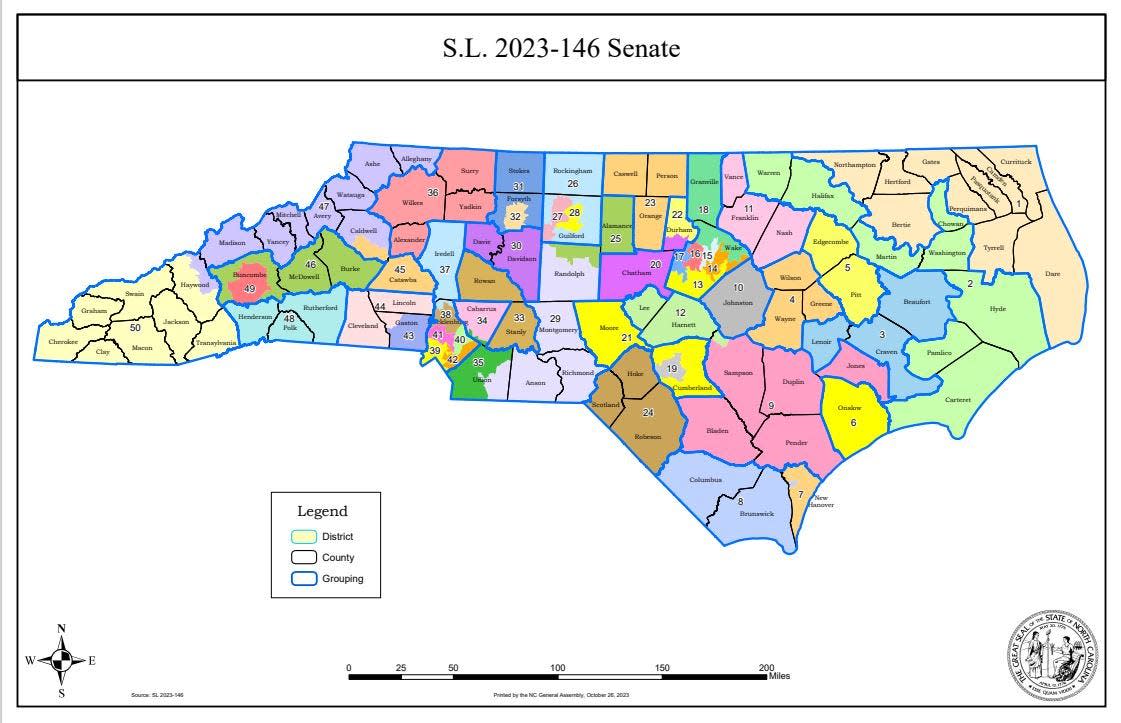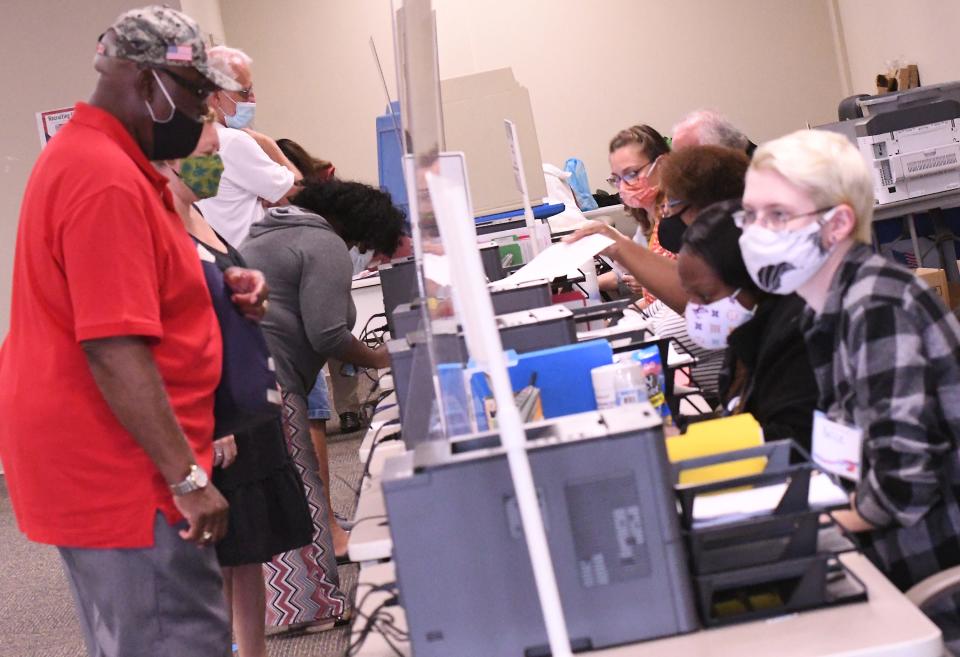Are Black voters in North Carolina at risk with redistricting maps under litigation?

The tussle for congressional power between North Carolina Republicans and Democrats has come to a head in the drawing of congressional maps that will rule the 2024 election.
Politicians, historically both Democrats and Republicans, create districts that favor their chances of holding power. Republicans had the power to draw the new maps in 2023. Now their maps are headed to federal court.
On Dec. 19, the North Carolina NAACP along with Common Cause, a nonpartisan nonprofit advocating for fair and transparent elections, and a group of eight residents filed a lawsuit against Republican mapmakers, including Philip Berger, Tim Moore and the State Board of Elections, for passing allegedly racially adjusted and rushed gerrymandered maps.
A similar case was recently brought to and decided by the highest court in the United States. In Allen v. Milligan, Alabama maps were under fire for attempting to silence Black voting power. In a 5-4 decision made in the summer of 2023, the Supreme Court of the United States declared that the maps were in fact violating the Voting Rights Act and thus creating a precedent for redistricting cases to follow.
The North Carolina lawsuit
When the North Carolina maps were redrawn in 2023 by legislators, the plaintiffs in the lawsuit claim, the North Carolina General Assembly "redrew its state legislative and congressional plans to severely diminish the voting power of North Carolina’s Black voters, who comprise over 22% of residents in the state."
The new maps are in violation of the Voting Rights Act, the plaintiffs claim.
The Voting Rights Act states, "No voting qualification or prerequisite to voting, or standard, practice, or procedure shall be imposed or applied by any State or political subdivision to deny or abridge the right of any citizen of the United States to vote on account of race or color."
Attempts to reach all six of the representatives involved in the mapmaking process listed in the case did not respond for comment.
The plaintiffs argue that the defendants did not consider racial demographics when creating the maps, that they intentionally and with "precision" diluted Black voters by clumping Black communities with white communities and lastly that the mapmaking process was “rushed” and “deficient" of public input.
As one of the lead lawyers representing Common Cause, NAACP and the eight individuals, Hilary Harris Klein stated in an interview, "The Supreme Court's made clear that during legislative session, legislators should explicitly be looking at the racial impact of their lines in order to assess Voting Rights Act compliance."
In the filing, the plaintiffs claim that mapmakers intentionally did not use racial data when drawing lines. This does not mean racial demographics weren't a factor, Klein said.
“It is really not in dispute that legislators already know the demographics of their state," Klein said. "They have to be familiar with their state by virtue of their job.”
The changes to districts can be seen in the coastal areas of North Carolina. For example, "In both Senate Districts 1 and 2, Black Belt counties are paired with coastal communities hundreds of miles away, resulting in extremely noncompact districts," according to the lawsuit.

The timeline
Although the maps under litigation will be used for the 2024 election, the plaintiffs requested a relief – in layman's terms: for the court to make a decision by a certain date – before the 2026 election so that if there are new maps, they would apply in 2026. With this timeline, Klein said, the trial will hopefully be held in early 2025.
If the courts decide the maps are in violation of the Voting Rights Act, the legislature will get the first chance to re-draw the maps to comply with the law. They will then be re-submitted to the courts for approval. If the re-drawn maps still do not comply with the law, the courts can decide to draw the maps themselves – similar to what recently happened in the Allen v. Milligan case.
When is the North Carolina Primary? Mark these key 2024 election dates
The impact
Bob Phillips, the executive director at Common Cause North Carolina, said in an interview that minority communities, like the Black community, will not get to choose representation that they see fit and that will impact how and if their communities' needs get met.
Phillips, who has been with the organization since 2001, has seen years of gerrymandering, but believes that in recent years the issue has gotten worse. This isn't necessarily a partisan problem, Phillips said, rather a problem of whoever is currently in power.
"Twenty years ago, Democrats were gerrymandering, not quite as robustly as they are now because they didn't have the technology for one, but they were in charge of drawing the maps and Democrats at the time had no inclination to consider redistricting reform," Phillips said. "The irony was I was standing shoulder-to-shoulder with Republicans in North Carolina calling for redistricting reform when the Democrats were in charge. Fast forward to today and it's reversed."
For Dennis Burns, a North Carolina resident, engaged voter and Common Cause member who has lived in the state for more than 25 years, redistricting impacts whether his community's needs are met. For example, he said, when his suburban neighborhood has been clumped with rural areas it poses challenges.
“The goals of rural neighborhoods or rural communities are generally different than the goals of urban communities..." Burns said. "When we get tied to the downtown districts, we probably have some of the same urban growth issues that they do – the traffic issues that they do – so our representation is okay, but when we get tied to the more rural legislators, the people representing say Granville County and Franklin County for the North, they have different issues.”
Not only can changing maps affect a community's voting power, it can also lead to a chaotic relationship between representatives and their constituents according to Burns. Burns said the changing of maps means he has to restart growing relationships with his representatives.

Purple status
North Carolina is known for being a swing, or purple state. According to the North Carolina Board of Elections website, from 1984 to 2020, North Carolina voted Republican nine out of the 10 presidential races and voted Democrat seven out of the 10 governors' races. Most recently, Democratic Gov. Roy Cooper was voted into office with 51.5% of votes against his competitor's 47.1%.
Phillips said North Carolina's purple reputation doesn't show up in the current General Assembly and it may not in the upcoming election either.
"I think the maps will reflect gerrymandering versus the actual facts that we are a highly competitive, very much almost evenly divided political state," Phillips said. "We may see out of 14 congressional seats, an 11-3 split and that's hardly evenly balanced like we have now.”
How does it end?
Litigation is merely a band-aid, Phillips said. The only long-term solution is redistricting reform, he said.
“North Carolina, as any other state that faces gerrymandering issues, really can't get out of this problem until we have a whole brand new redistricting process, a better way of drawing the maps," Phillips said. "And first and foremost, in our minds, it starts with getting the map making out of the hands of lawmakers and putting it to an independent redistricting commission made up of citizens that includes Independents, Democrats, Republicans and is reflective of this state in gender, race and geography."
Being that North Carolina is not a ballot initiative state, redistricting reform would have to be passed by the legislature. Phillips said he is waiting for a highly contested race where voters can demand that legislators promise to pass redistricting reform and then hold them to their word when in office.
This article originally appeared on Wilmington StarNews: Redistricting maps in NC under scrutiny for Voting Rights Act violation

